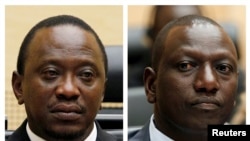Kenya’s Constitutional Court plans to begin hearing a petition on Wednesday that seeks to prevent both President Uhuru Kenyatta and Vice President William Ruto from appearing at the International Criminal Court (ICC) until they serve their full five year term.
The ICC prosecutors accuse President Kenyatta and his deputy Ruto of playing a role in Kenya’s 2007-2008 post-election violence that left about 1,300 dead and hundreds of thousands displaced. Ruto’s trial is expected to begin next week.
The National Conservative Forum (NCF), a civil society group, filed the petition arguing that the leaders’ presence at their own trial at the Hague-based court could create a power vacuum and a constitutional crisis.
The group contends that the constitution requires both the president and his deputy to be in the country, unless only one of them is out of the country on normal and official state duties.
“There is no constitutional mandate for them to hand over the instrument of power to anyone. In fact the president cannot hand over the instrument of power to anyone,” argued Jennifer Shamalla, head of the National Conservative Forum. “But now in Kenya there is a realization that there is a very great possibility that both the president and his deputy could be away at the same time.”
Shamalla says Kenyans worry that the absence of the two leaders also could create tension and uncertainty, especially because the country often comes under attack by the Somali-based Islamic militant group, al-Shabab.
In an affidavit to the court, Shamalla said since Kenya faces both internal and external security threats, the absence of Kenyatta and Ruto would put the country and its citizens at a security risk.
“We cannot afford a situation whereby if the president and his deputy may of course at the same time be out of this country, there is a vacuum in one arm of the government, which is the executive,” said Shamalla. “Kenya is a country that is in a very volatile region [and] we are at war as we speak with al-Shabab and porous borders in the north.”
Shamalla says there is possibility that ethnic tensions could be stoked, which could plunge the country into another round of violence.
“If you take into consideration that very rather delicate situation in this country and the region, there are people who can always take advantage of this situation. And we definitely don’t want Kenya going the Egypt, Libya or Syria way,” said Shamalla.
“And while I care deeply for the victims, we must also take into consideration that there is a possibility of it escalating to a point where you can have the even more chaos than you had in 2007-2008,” she said.
Shamalla says her group expedited the petition in anticipation of the trial of Deputy President Ruto, which begins next week at The Hague.
But critics say the petition is a publicity stunt since Kenya’s Constitutional Court does not have jurisdiction over the ICC trial. Shamalla disagreed.
“If you have a look at the application, there is a very sound argument that we have made. It’s not a publicity stunt,” she said.
The ICC prosecutors accuse President Kenyatta and his deputy Ruto of playing a role in Kenya’s 2007-2008 post-election violence that left about 1,300 dead and hundreds of thousands displaced. Ruto’s trial is expected to begin next week.
The National Conservative Forum (NCF), a civil society group, filed the petition arguing that the leaders’ presence at their own trial at the Hague-based court could create a power vacuum and a constitutional crisis.
The group contends that the constitution requires both the president and his deputy to be in the country, unless only one of them is out of the country on normal and official state duties.
“There is no constitutional mandate for them to hand over the instrument of power to anyone. In fact the president cannot hand over the instrument of power to anyone,” argued Jennifer Shamalla, head of the National Conservative Forum. “But now in Kenya there is a realization that there is a very great possibility that both the president and his deputy could be away at the same time.”
Shamalla says Kenyans worry that the absence of the two leaders also could create tension and uncertainty, especially because the country often comes under attack by the Somali-based Islamic militant group, al-Shabab.
In an affidavit to the court, Shamalla said since Kenya faces both internal and external security threats, the absence of Kenyatta and Ruto would put the country and its citizens at a security risk.
“We cannot afford a situation whereby if the president and his deputy may of course at the same time be out of this country, there is a vacuum in one arm of the government, which is the executive,” said Shamalla. “Kenya is a country that is in a very volatile region [and] we are at war as we speak with al-Shabab and porous borders in the north.”
Shamalla says there is possibility that ethnic tensions could be stoked, which could plunge the country into another round of violence.
“If you take into consideration that very rather delicate situation in this country and the region, there are people who can always take advantage of this situation. And we definitely don’t want Kenya going the Egypt, Libya or Syria way,” said Shamalla.
“And while I care deeply for the victims, we must also take into consideration that there is a possibility of it escalating to a point where you can have the even more chaos than you had in 2007-2008,” she said.
Shamalla says her group expedited the petition in anticipation of the trial of Deputy President Ruto, which begins next week at The Hague.
But critics say the petition is a publicity stunt since Kenya’s Constitutional Court does not have jurisdiction over the ICC trial. Shamalla disagreed.
“If you have a look at the application, there is a very sound argument that we have made. It’s not a publicity stunt,” she said.





